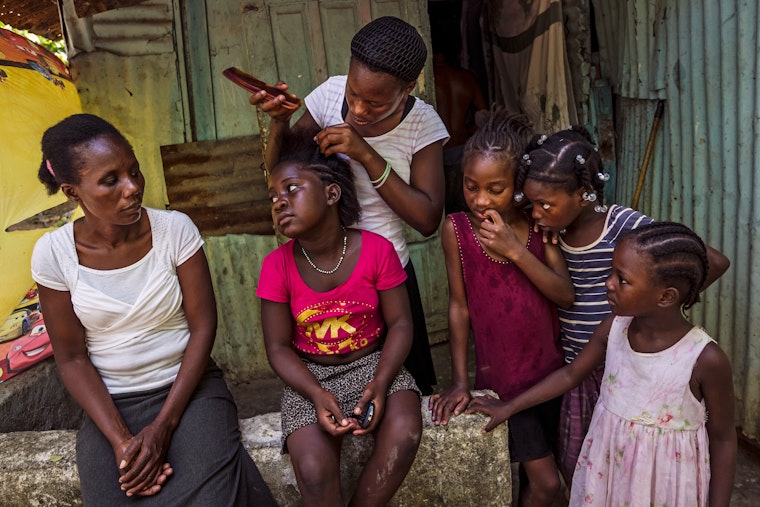Finding a Way Out of Legal Limbo in the Dominican Republic
By Cassandre Theano

When Solanger finally received her national identity card, it was more than just a piece of official documentation for the 29-year-old Dominican. “I feel like a person!” she declared, a recognition that this little card would make a huge difference for her and her three young children.
Solanger was born, raised, and still resides in Las Pajas, one of the many settlements for workers and their families—known as bateys—that dot the sugar cane fields of the Dominican Republic. Most of the families living in bateys today are descended from workers who were originally recruited, across the border, in Haiti.
Under the Dominican constitution, Solanger’s birth in 1987 made her a Dominican citizen. But after her original birth certificate was misplaced when she was in her teens, all of her attempts to reestablish her legal identity through her existing documents had led to nothing. That meant no national ID card, or cedula; in the Dominican Republic, you need a cedula to get a formal job, to attend secondary school, to access government medical care, to open a bank account, to own a cell phone, and to get past routine police check points.
Without the money to hire a lawyer to argue her case, and facing government officials who had no interest in resolving her case, Solanger had resigned herself to living a half-life. Then, through a chance visit to job training program in San Pedro de Macorís, everything changed.
At the offices of the local NGO running the program Asociación Scalabriniana al Servicio de Movilidad (ASCALA), Solanger met Mayelin, a lawyer who supervises an effort to provide basic legal advice to community members. Mayelin knew what Solanger needed to do to get her cedula. It wasn’t easy, and involved several trips to a local government office, with Mayelin‘s assistance. But it worked. Solanger was able to obtain her cedula, paving the way for her to register her own children in the civil registry.
ASCALA and another community group, Movimiento Socio Cultural para los Trabajadores Haitianos (MOSCTHA), launched the paralegal project in December 2015, with the help of the Open Society Justice Initiative and the International Senior Lawyers Project.
The project, modeled on other paralegal interventions around the world, was a direct response to a growing crisis threatening Dominicans of Haitian descent, after a bitterly disputed retroactive Supreme Court ruling that challenged their rights to citizenship. In response, Law 169-14, proposed by President Danilo Medina and passed by parliament on May 21 2014, split Dominican Haitians into two groups.
The first group, commonly referred to as Group A, had already been inscribed as nationals in the Civil Registry. For them, the law promised a fast-track restoration of citizenship. Solanger fell within this first group.
For Group B, the situation was worse. These individuals, though born in the Dominican Republic, had not been included in the civil registry at the time of their birth, something that happened quite frequently in poor communities that were often largely ignored by local officialdom. Under the new law a member of this group was required to register as a “foreigner,” then wait two years to become eligible for “naturalization.” This portion of the law expired on February 1, 2015, and the Dominican government has yet to revisit it.
The paralegal project was designed to help people navigate this web of new regulations. The challenges included the cost, despite the fact that the application itself was technically free (as one client put it, “it is the costliest free process”). The costs of putting together an application included transportation, supporting documents, and bribes, not to mention lost work time.
Local officials put up barriers, too—sometimes reflecting the generalized discrimination against Dominicans of Haitian descent that has fueled the controversy over their nationality rights, while others refused to provide the requested documents due to a poor understanding of the way the law was supposed to work. The lack of an adequate public information campaign meant that many people either didn’t know about the law, or found out about it after the February 2015 deadline for Group B registration. In Solanger’s case, she initially had no idea she was a potential beneficiary of the law.
Unlike Solanger and others in Group A, most of those in Group B have yet to benefit from the law’s provisions. Another client of the paralegal project, Reynaldo, missed the February 2015 application deadline. He remains unregistered, leaving his civil status in limbo despite his having proof that he was born in a Dominican hospital. Effectively stateless, he is holding out hope for a solution despite the constantly looming specter of expulsion from his home country.
There are believed to be tens of thousands of people who have been left in similar circumstances in the aftermath of Law 169-14. Unfortunately, the community-based paralegal projects cannot continue indefinitely supported by donor funding alone—and they have reached only a small proportion of those affected by the crisis. But they do provide a model for the kind of community-based response needed to resolve the Dominican Republic’s nationality crisis—an approach that needs to be combined with moves to resolve the current regulatory contradictions.
The Dominican Republic has pledged to provide legal identity for all (one of the goals of the UN’s 2030 Agenda for Sustainable Global Development). The government of President Medina, who was reelected in May last year, should take steps to deliver on this commitment—by addressing the problems still facing people like Reynaldo, regularizing their position as citizens of the country where they were born and considering how to make paralegal services an ongoing part of the legal outreach of the state.
Until August 2018, Cassandre Theano was an associate legal officer for the Open Society Justice Initiative.